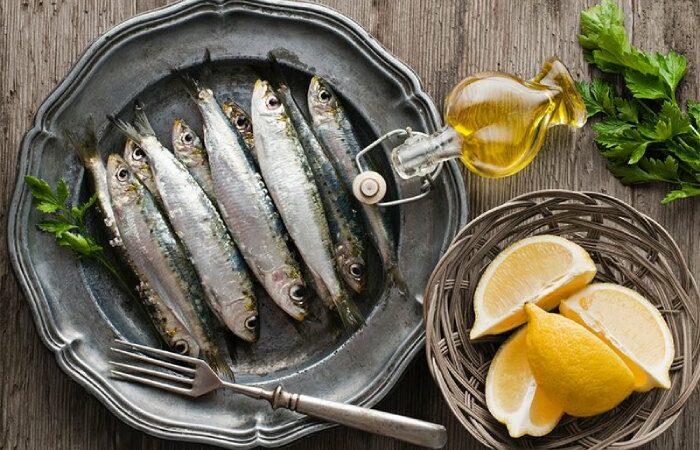Sardines have a lot of taste and nutrition packed into each tiny fish, whether you like them or not. These tiny silver fish are canned in a mixture of water, oil, spicy sauce, mustard sauce, and other flavours. Unlike canned tuna or salmon, sardines are packed intact because each fish is less than 25 centimetres long and can be consumed skin, bones, and all.
Don’t be fooled by their appearance; sardines have a delicious flavour if you like other “fishy” fish like salmon or herring. They taste great spread on crackers, heaped high on toast, put in a salad, or stuffed inside of bell peppers. And these are only some of the numerous ways you might delight in them!
Additionally, sardines offer a lot of nutrition at a moderate cost. Sardines come in cans and weigh 3.75 ounces. One can has 22 grammes of protein and costs $1.50 or less.
These small fish are inexpensive, versatile, and bursting with flavour, but how nutritious are they really? Here are four possible negative effects of consuming sardines on your health.
-
They can improve your bones-
Sardines naturally include two essential minerals that support maintaining bone health as you age. Sardine bones are so little and delicate that the fish keeps them, which is excellent for your own bones. According to Anya Rosen, MS, RD, LD, INFCP, CPT, a virtual functional medicine practitioner based in New York City, “Sardines with the bones are a great source of non-dairy calcium, which is essential for bone health.”
More calcium is present in one tin of sardines than in a cup of milk: 27% of the Daily Value (DV)! Like us, sardines store the majority of their calcium in their bones.
Sardines are also an excellent source of vitamin D, which works in conjunction with calcium to maintain your bones strong and healthy. Your body needs vitamin D, a fat-soluble vitamin, to absorb calcium. Calcium cannot effectively safeguard your bone strength and integrity if you have insufficient vitamin D levels.
Natural sources of vitamin D include oily fish like sardines, mackerel, swordfish, and salmon. 22 percent of your DV is found in one can of sardines.
-
They might protect your heart-
Given that each can of sardines contains 1 g of the heart-protecting unsaturated fat, they are a practical method to eat more omega-3 fatty acids. According to registered dietitian at Sizzling Nutrition Bethany Keith MS, RDN, LD, CNSC, “A diet rich in omega-3 fatty acids has many potential benefits, including lower cholesterol, lower levels of inflammation, and lower risk of developing heart disease.”
In an analysis published in 2021 in JAMA Internal Medicine, scientists examined information from over 200,000 adults (with and without heart disease). They discovered that consuming at least two meals (175 grammes) of fatty fish per week significantly reduced both death and major heart disease risk in persons in good health.
-
They might bring on a flare-up of gout-
“A high intake of sardines might contribute to flare-ups among gout sufferers, and some varieties of canned sardines can have a high sodium content,” says dietitian
A particularly painful type of arthritis is gout. When flare-ups occur, joints such as the big toe, ankle, or knee may experience shooting pain, burning, or discomfort. A diet heavy in purines, a naturally occurring chemical that transforms into uric acid in the body, has been linked to gout flare-ups. Gout episodes happen when uric acid crystals accumulate in the joints, producing excruciating pain and inflammation.
Purines are found in abundance in sardines, anchovies, mussels, trout, and red meat. Sardines are still permissible to eat, but you may need to watch your portions and the rest of your diet as well. Talk to your doctor or nutritionist if you have gout since you may need to reduce your sardine intake or change your normal eating habits to accommodate them, advises Laing.
-
They’ll give you an energy boost-
Sardines are a great source of vitamin B12 as well as calcium, vitamin D, omega-3 fatty acids, and protein. 343 percent of your DV for vitamin B12 is present in one tin of sardines.
Older folks, those with pernicious anaemia (a condition that inhibits the stomach from absorbing B12), those with various stomach diseases, vegetarians, and vegans are the groups most likely to experience deficiencies in this water-soluble vitamin. Low energy, exhaustion, and breathlessness can result from a vitamin B12 deficiency.
Sardines and other forms of vitamin B12 as well as high-quality proteins will help you feel more energised on a regular basis, even if they won’t offer you an immediate energy boost as caffeine will.
- Jerry Rice Award History: Every Winner of the FCS Freshman Award - December 13, 2025
- When Do New Episodes of Taylor Swift’s The End of an Era Drop? | Schedule, Dates & Updates - December 13, 2025
- When Does ‘Matlock’ Return? 2026 Premiere Date Guide - December 12, 2025





